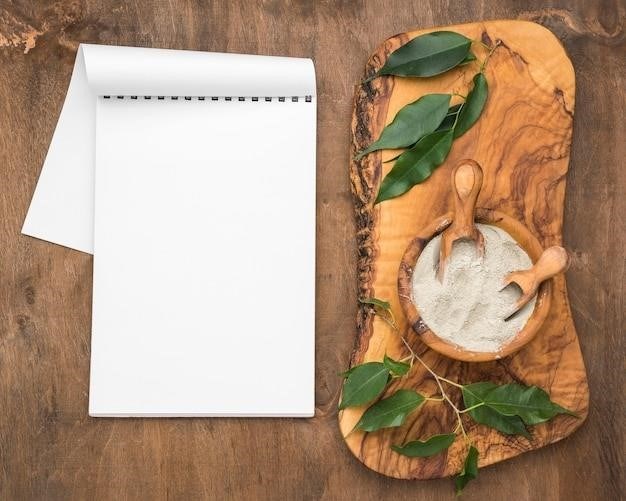Making Herbal Medicine⁚ A Comprehensive Guide
This comprehensive guide will explore the world of herbal medicine, from its rich history to modern applications. Discover the benefits of using herbs for health and well-being, and learn practical techniques for making your own herbal remedies. We’ll delve into choosing the right herbs, harvesting and preparing them, and various extraction methods. This guide will also cover safety considerations, dosage, and potential side effects, ensuring you approach herbal medicine with confidence and knowledge.
Introduction to Herbal Medicine
Herbal medicine, also known as phytotherapy, is a holistic approach to healthcare that utilizes plants and their extracts for therapeutic purposes. This ancient practice, dating back thousands of years, is rooted in the belief that nature provides potent healing properties. From traditional Chinese medicine to Ayurveda, various cultures around the world have embraced the use of herbs for treating ailments and promoting overall well-being. Herbal medicine encompasses a wide range of practices, including the use of teas, tinctures, salves, and other preparations derived from plants. The growing interest in natural remedies and a desire for holistic healthcare approaches have fueled a resurgence in herbal medicine, making it an increasingly popular alternative or complementary therapy.
The History of Herbal Medicine
The history of herbal medicine is deeply intertwined with the evolution of human civilization. Archaeological evidence suggests that humans have been using plants for medicinal purposes for at least 60,000 years. Ancient civilizations, such as the Egyptians, Greeks, Romans, and Chinese, developed sophisticated systems of herbal medicine, meticulously documenting their knowledge in scrolls, tablets, and other forms of writing. These ancient herbalists meticulously observed the effects of plants on the human body, developing remedies for a wide range of ailments. Herbal medicine played a pivotal role in healthcare before the advent of modern medicine, and its practices continue to influence the development of new drugs and therapies even today.
Types of Herbal Medicines
Herbal medicines encompass a vast array of preparations derived from different parts of plants, each with unique properties and applications. These preparations can be broadly categorized into tinctures, infusions, decoctions, salves, oils, and more; Tinctures, often made by soaking herbs in alcohol, are potent extracts that offer concentrated benefits. Infusions are created by steeping herbs in hot water, resulting in a gentle and readily digestible remedy. Decoctions, on the other hand, involve simmering herbs in water for an extended period, extracting their more robust constituents. Salves, made by combining herbs with a base of oil and wax, are topical remedies for skin conditions. Oils, infused with herbs, provide aromatic and medicinal benefits, often used for massage or topical application.
Benefits of Herbal Medicine
Herbal medicine offers a holistic approach to health and well-being, addressing various aspects of physical and emotional balance. From easing digestive discomfort and promoting restful sleep to supporting immune function and promoting mental clarity, herbs have a long history of being used for their therapeutic properties. Many herbs contain antioxidants that protect cells from damage, while others possess anti-inflammatory properties that can help reduce pain and inflammation. Herbal remedies can also support the body’s natural detoxification processes and contribute to overall vitality and resilience. It’s essential to remember that while herbal medicine holds great potential, it’s not a replacement for conventional medical care. Always consult with a healthcare professional before incorporating herbs into your health routine, especially if you have underlying medical conditions or are taking medications.
Safety and Quality of Herbal Medicines
Ensuring the safety and quality of herbal medicines is paramount. It’s crucial to source herbs from reputable suppliers who prioritize sustainable practices and adhere to quality control standards. Look for organic herbs, as they are free from pesticides and other harmful chemicals. Always store herbs properly to maintain their potency and freshness, and be mindful of potential interactions with other medications. While herbal medicine often offers a gentle approach to health, some herbs can have potent effects and may not be suitable for everyone, especially pregnant women, breastfeeding mothers, and individuals with specific health conditions. Consulting with a qualified healthcare professional, such as a naturopathic doctor or herbalist, can provide personalized guidance on choosing and using herbs safely and effectively.

Making Your Own Herbal Medicines
This section will guide you through the process of creating your own herbal remedies, from selecting the right herbs to safely storing your finished products.
Choosing the Right Herbs
The foundation of effective herbal medicine lies in selecting the right herbs for your needs. Consider your desired outcome, whether it’s easing anxiety, boosting immunity, or promoting restful sleep. Research the properties of various herbs, paying attention to their traditional uses and scientific studies. Choose herbs that are known to address your specific concerns. Ensure you source your herbs from reputable suppliers, prioritizing organic and sustainably harvested options to minimize potential contaminants and support ethical practices. Always prioritize quality and freshness when selecting your herbs.
Harvesting and Preparing Herbs
Harvesting herbs at their peak potency is crucial for maximizing their medicinal properties. Timing is key, as different herbs have optimal harvest periods. For example, flowers are typically harvested when they are fully open, while leaves are often gathered before they reach full maturity. Always use clean tools and avoid harvesting from areas that may be contaminated by pesticides or pollutants. Once harvested, herbs should be cleaned thoroughly and dried properly to preserve their active compounds. Drying methods vary depending on the herb, but air drying, oven drying, or dehydrating are common techniques. Properly dried herbs can be stored in airtight containers for extended periods, retaining their potency.
Extraction Methods for Herbal Medicines
Extracting the active compounds from herbs is essential for creating potent herbal remedies. Various methods are employed, each yielding different concentrations and properties. Infusion, a gentle method, involves steeping herbs in hot water, creating a tea. Decoction, suitable for tougher plant parts, involves simmering herbs in water for longer periods. Tinctures, potent alcohol-based extracts, preserve the herb’s properties over time. Maceration uses oil or alcohol to extract compounds over several weeks. Other methods include decoction, poultices, and salves, each suited to specific applications. Choosing the appropriate extraction method depends on the herb’s properties, desired potency, and intended use.
Formulating Herbal Remedies
Formulating herbal remedies requires careful consideration of the chosen herbs, their properties, and the desired outcome. Understanding the synergy between different herbs is crucial, as combining them can enhance their effects or create new therapeutic properties. The art of herbal formulation involves considering the herb’s potency, dosage, and the intended use. For example, a calming blend might combine chamomile, lavender, and valerian root, while a digestive formula could include ginger, peppermint, and fennel. It’s essential to research and experiment with different combinations to find what works best for you or your intended recipient. Always start with small doses and observe the effects before increasing the amount.
Storing Herbal Medicines
Proper storage is essential to preserve the potency and effectiveness of herbal medicines. Dried herbs should be stored in airtight containers, away from direct sunlight, heat, and moisture. These conditions can degrade the active compounds in the herbs, reducing their therapeutic value. Label your containers clearly with the herb’s name, date of harvest, and preparation method. For tinctures and oils, dark glass bottles are ideal to protect them from light. Store them in a cool, dark place, preferably at room temperature. Avoid storing herbal medicines in the refrigerator, as this can cause condensation and moisture buildup. Remember to review the shelf life of each preparation and discard any expired or moldy herbs or preparations.

Using Herbal Medicines Safely
Herbal medicine, while often beneficial, requires careful use to ensure safety and effectiveness. It’s important to understand proper dosage, potential side effects, and interactions with other medications.
Understanding Dosage and Frequency
Dosage and frequency are crucial aspects of using herbal medicines safely and effectively. The appropriate dosage varies depending on factors such as the specific herb, its potency, the individual’s health condition, and their body weight. It’s essential to follow recommended dosages provided by a qualified herbalist, practitioner, or reliable herbal reference guide. Exceeding recommended dosages can lead to unwanted side effects or even toxicity. Frequency of use is also important, as some herbs may be best taken once daily, while others might require multiple doses throughout the day. Consulting with a healthcare professional or a knowledgeable herbalist is highly recommended to determine the optimal dosage and frequency for your specific needs.
Potential Side Effects and Interactions
While herbal medicines are often considered natural and safe, it’s crucial to be aware of potential side effects and interactions. Some herbs can interact with medications, leading to adverse effects. For example, St. John’s Wort, commonly used for depression, can interact with certain antidepressants. It’s essential to discuss any herbal remedies you’re considering with your healthcare provider, especially if you’re taking prescription medications or have underlying health conditions. Certain herbs can also cause side effects, such as nausea, diarrhea, or allergic reactions. Always start with a low dose and observe your body’s response. If you experience any adverse effects, stop using the herb and consult with a qualified healthcare professional.
Consulting a Healthcare Professional
While herbal medicine offers a wealth of potential benefits, it’s crucial to approach it with caution and seek guidance from a qualified healthcare professional. A healthcare provider can assess your individual needs, medical history, and potential interactions with other medications you may be taking. They can also help determine the appropriate dosage and duration of treatment. If you have any concerns or experience adverse effects, a healthcare professional can provide valuable advice and address your specific situation. Remember, herbal medicine should complement, not replace, conventional medical care.
Resources for Learning More
The world of herbal medicine is vast and ever-evolving, offering a continuous stream of knowledge to explore. To deepen your understanding, consider consulting reputable resources such as books, journals, and online platforms dedicated to herbalism. The International Agency for Research on Cancer (IARC) provides valuable publications and handbooks on the topic. Look for resources that combine scientific evidence with traditional knowledge, ensuring a well-rounded approach to herbal medicine. Additionally, consider joining online communities or attending workshops led by experienced herbalists to engage in discussions and share knowledge with others.
Herbal medicine offers a rich history and a promising future for natural healing, empowering individuals to take an active role in their health journey.
The Future of Herbal Medicine
The future of herbal medicine is bright, driven by a growing global interest in natural remedies and a renewed focus on holistic health. Scientific research continues to uncover the complex chemical compounds within plants and their potential therapeutic benefits. This has led to a surge in interest in clinical trials to validate traditional uses and explore new applications for herbal medicines; Furthermore, the integration of herbal medicine into mainstream healthcare systems, particularly in countries like China, is paving the way for increased accessibility and acceptance. With ongoing research and a growing body of evidence, herbal medicine is poised to play an increasingly significant role in promoting health and well-being worldwide.
Making Herbal Medicine a Part of Your Health Routine
Integrating herbal medicine into your health routine can be a rewarding journey. Start by choosing herbs that resonate with your specific needs and goals. Research the potential benefits and side effects, and consult with a qualified healthcare professional to ensure safe and effective use. Incorporate herbal remedies gradually, starting with small doses and observing your body’s response. Consider blending herbal preparations into your daily life through teas, tinctures, or topical applications. Embrace the ancient wisdom of herbalism while staying informed about current research and evidence-based practices. By approaching herbal medicine with an open mind and a commitment to safety, you can unlock the natural healing power of plants and cultivate a healthier and more vibrant life.



